Stories by Barbara Duckworth
LONDON, Ont. — Build it and they will come. That philosophy seems to be working for Cargill Meats’ sustainable beef program. Since last October, Cargill offered a per head payment to producers who are able to supply beef that went through an audited program with indictors established by the Canadian Roundtable for Sustainable Beef. A […] Read more

Trump’s agenda sends beef sector on rocky road
LONDON, Ont. — North American beef producers are feeling the bumps and bruises as trade talks linger. The Canadian, American and Mexican beef sectors generally agree that the North American Free Trade Agreement is a good deal and they don’t want to see it disappear. However, the trade polices of U.S. President Donald Trump are […] Read more

Alta. farm prepares for next generation
BEISEKER, Alta. — On a hot day in early August, the Schissel family set about preparing for this year’s harvest. Don and Betty Schissel, who were recently named a master farm family by their municipality of Rockyview County, have tilled and harvested their fields northeast of Calgary for about 100 years. It has been a […] Read more
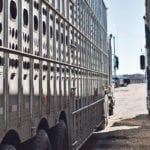
Transport review focuses on travel time
The Canadian Food Inspection Agency recently received a summary of the 9,500 comments on the proposed amendments
LONDON, Ont. — Canada’s humane transport regulation for livestock was developed in 1977, and 10 years ago the Canadian Food Inspection Agency said amendments were needed. Growing public interest in livestock transportation and its effects on animals has been expressed in the press and through social media, but updated regulations have moved at glacial speed. […] Read more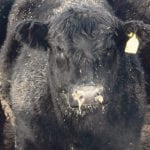
Livestock traceability changes delayed
A strong, vigorous system remains the goal for the Canadian Food Inspection Agency to provide assurance to consumers
LONDON, Ont. — Anticipated regulatory changes to Canada’s livestock traceability system have been delayed until next year. “The earliest we will be advancing these will be in the spring of next year so we can work out any issues that remain,” said Colleen Barnes, associate vice-president of policy and programs branch at the Canadian Food […] Read more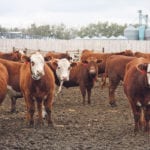
Exports continue to drive beef markets
Canada set a record in export sales in 2017 at more than $2.4 billion in value, even though the country’s herd is shrinking
LONDON, Ont. — The beef sectors in Canada and the United States rely heavily on exports. Record amounts of beef are being exported for more money, which props up domestic prices. Canada set a record in export sales in 2017 at more than $2.4 billion in value, although the volume is not a record, said […] Read moreAntibiotic alternatives may offer treatment options for producers
Producers need more alternatives to antibiotics for treating their animals as antibiotic restrictions loom and bacterial resistance to common antibiotics becomes more routine. Graeme McRae of NovaVive, an Ontario company that produces immunobiology-based technologies, said products that naturally stimulate the immune system may offer an alternative. The company has received government approval for a product […] Read more
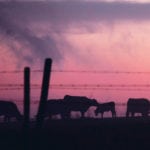
Antibiotic resistance needs more work
A recent survey found 67 countries have information on antibiotic use in animals, but only 41 collect systematic data
An international survey has found that most countries have good intentions when it comes to tracking antimicrobial resistance and antibiotic use among humans, animals and plants, but more work is needed. All World Health Organization member states agreed on a global action plan in 2015, saying they would have antimicrobial resistance plans in place within […] Read more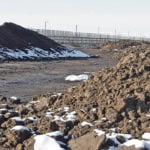
Study evaluates antibiotic degradation in manure
Composted manure is a good slow release fertilizer with the added benefit of breaking down common antibiotics. It is estimated about 1.6 million kilograms of antimicrobials are used every year in Canadian livestock. Thirty to 90 percent of the products may be excreted as original compounds or byproducts called metabolites. Various research projects have shown […] Read more

CFIA inspectors investigate pig transportation video
The video of the pigs stopped in a truck at Kamloops was posted online by an animal rights advocacy group
The Canadian Food Inspection Agency is reviewing a video posted online of pigs in apparent distress while being transported. The CFIA said in an email that it is investigating. Animal Justice, an animal rights advocacy group, posted the video of pigs in a truck stopped at Kamloops, B.C. It said the temperature was 32 C […] Read more



